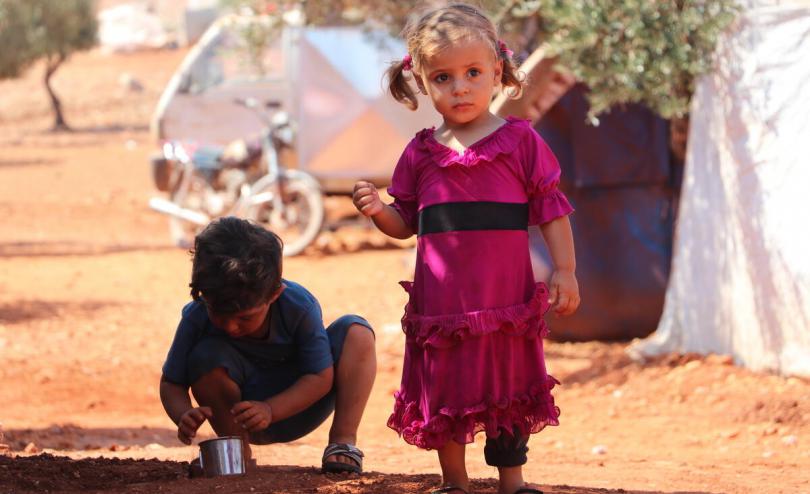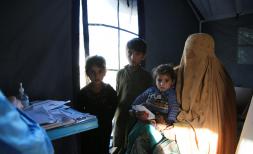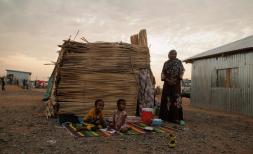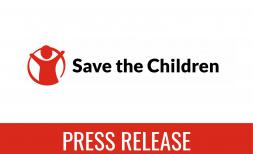Hundreds of thousands more children in Syria face hunger

Seven hundred thousand more children face hunger in Syria owing to the country’s badly-damaged economy, partly due to the impact of the COVID-19 restrictions.
It means in the last six months, the total number of food insecure children across the country has risen to more than 4.6 million[1].
After almost ten years of conflict and displacement, an unprecedented number of children in Syria are now battling soaring rates of malnutrition, a new report by Save the Children reveals.
Across Syria, 5,480 cases of COVID-19 have been confirmed so far.[2]These numbers are likely to be just the tip of iceberg, as there are huge gaps in testing and a shortage in Personal Protective Equipment.[3] Many people report being advised to take over-the-counter medicine without a test when showing symptoms. There have also been claims of an increase in the daily requests for gravediggers, in some areas.[4]
Coronavirus restrictions, years of violence, and mass job losses have devastated millions of people’s livelihoods. Currency depreciation and a reduction in the flow of goods have made the situation worse, pushing food prices ever higher. According to the World Food Programme, a food basket that can feed a family now costs more than 23 times the pre-crisis average – and more than double the previous peak in 2016.[5]
Ten-year-old Faten* who lives in a displacement camp in North West Syria, said, “We don’t always eat in the evening because there is no bread. Sometimes I get hungry at noon, or in the afternoon; I get hungry, but I can never find bread to eat…When we were home we could eat whatever we wanted, but here, the food is different than it was at home... and we can’t afford to buy [food] anymore.”
Parents are left with no choice but to cut out fresh food such as meat, fruit and vegetables, instead relying on rice or grains for weeks on end. A recent survey conducted by Save the Children found that 65% of children have not had an apple, an orange, or a banana for at least three months. In North East Syria, almost a quarter of children said that they had not eaten these fruits in at least nine months.
Ten-year-old Noura* said, “The last time I had fruit was more than 2 months ago. When I ask my parents to buy us some, they say we can barely afford food.”
Many children told Save the Children that all they had eaten over the past weeks was rice and beans. One mother said she saved up for three weeks to buy a single apple, which she split five ways between her and her family. Another child who had not eaten any fresh fruit or vegetables for six months had one piece of prune which he found on the ground.
Father-of-two Rami* said, “My [two] children are six years old… and two months old. Their growth has stopped so much. I took them to many doctors, they gave us medicine, but they didn’t get better, not even one percent. Sometimes they say malnutrition, sometimes something else... I got all kinds of medicine... every half a month I buy medicine for around 7,000 Syrian pounds”.
A prolonged lack of nutritious food in the daily meals can cause lifelong risks for children, including stunting, or chronic malnutrition. In Syria, at least one in eight children, or 500,000, currently suffer from this condition.[6]
“Malnutrition is a greatly overlooked problem facing Syria’s children.” Save the Children’s Syria Response Director, Sonia Khush, said. “Malnourished children face myriad risks to their health and wellbeing, such as stunting, which limits children’s ability to fight off disease, increases the likelihood of anxiety and depression, and leads to poor performance in school.
“A whole generation of children are facing the risk of malnutrition, because their families simply can no longer afford to put a meal on the table. Unless we act now to alleviate this suffering, more children will have to watch as their portion of food becomes smaller by the day.”
Save the Children will be distributing food parcels with fresh fruits and vegetables in northern Syria, targeting pregnant women and new mothers, to combat hidden hunger in children and mothers. Save the Children also supports young children across Syria, providing dietary advice and screening for malnutrition.
Save the Children says it is vital that the international community comes together to invest in efforts to improve the availability and affordability of safe and nutritious food. While the needs across Syria are deepening owing to COVID-19 and the economic impacts of the conflict, the requirements for nutrition are only 11% funded.[7]
Save the Children is also calling for unrestricted humanitarian access and the reauthorisation of border crossings, including in Bab Al Salam north of Aleppo which was closed in July, to ease the suffering for families and children who continue to struggle in the middle of a prolonged economic crisis and the spread of a pandemic.
To support Save the Children’s global COVID-19 emergency appeal, click here.
Read the full report on 'Hidden Hunger in Syria: A look at malnutrition across Syria with a focus on under-twos' here.
Notes to Editors
- The value of the Syrian Pound (SYP) in informal markets in northwest Syria fluctuated around 2,100 SYP per US Dollar for most of the last two weeks.
- As a result of the recent instability of the value of SYP and rapid devaluation, the Turkish Lira (TRY) has been increasingly used as a transactional currency in northwest Syria, with basic commodities such as fuel, bread, transport and telecommunications services now priced in TRY.
- Stunting is a form of growth failure which develops over a long period of time when children are chronically deprived of essential nutrients, health and care during the first 1,000 days of their lives. As a result, their bodies and brains are prevented from reaching their full potential.
- We have some strong content available under the same embargo, including social videos, which you can find here: North-West Syria, North-East Syria.
For more information, feel free to reach out to:
Ahmed Bayram, Ahmed.Bayram@savethechildren.org / +961 71 562 855
Rik Goverde, rik.goverde@savethechildren.org / +44 (0) 7732 602 301
During out-of-office hours: Media@savethechildren.org.uk / +44 7831 650 409
[1] Based on WFP numbers showing an additional 1.4 million people have become food insecure over the past six months. General estimates suggest that around 50% of the population in Syria are children.
[2] Based on official government count of 3,833 in addition to 1,647 cases identified in opposition held areas
[6] UNOCHA, Humanitarian Needs Overview 2020, In press.




